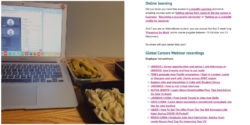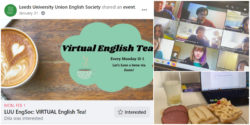My Remote Experiences

Introduction
Hello everyone, it’s Yuesong, Amber, Iris and Shanté, and we will be sharing our experiences with transitioning to virtual learning and adjusting to studying online.
Yuesong: Acclimatising to 'All-virtual Experiences'
For us students in the first-year, 2020 has been a difficult year filled with challenges, but at the same time with unprecedented new possibilities and opportunities. Though home-country-based study is permitted, I chose to physically come to Leeds this September in order to optimise my learning pace and quickly acclimatise myself to the university environment. The most challenging part I found during the process was mainly being lack of knowledge regarding 1) university course structure and types, 2) university campus buildings and its corresponding services, and 3) application process and timeline for internships, lack of physical help due to COVID further put me in a disadvantaged position...
However, I found Flying Start quite useful for this acclimatisation process. Flying Start is a website featuring series of articles and videos, designed to help first-years to understand what studying at university really means and how is it different from sixth form. Together with the help from my lecturers and tutors I quickly adapted and learnt how to study effectively and independently in such a new environment. The University of Leeds website features campus map and interactive tours which guide you through each building and its corresponding services provided. Remote learning allowed me to manage my time more flexibly and made multiple meetings and tutorials from different locations and providers possible.

The EPS Employability department provides me with ample amount of help regarding online applications in job markets. I found the employability webinars quite useful and informative, the CV workshops and peer supports provided by university societies like LUUTIS (Leeds University Union Trading and Investment Society) has also been of great help. The most amazing thing I found on the website is the section of Practice Tests/ Video Interviews/ Gamification, where it features loads of Online Free Psychometric Tests for you to practice, and they are super useful for online tests. The university has also paid some of the services like Financial Times, LinkedIn Learning, Profiling For Success (for OT), Coursera, etc. which has been very helpful in terms of helping me gain and enhance knowledge in a specific field that may not covered by my university course, which increases my competitive edge in job market.
Through the help of university, combined with the efforts of myself, I have been able to secure a three-week spring internship (a placement/internship undertaken during the Easter holidays of the first year at university, critical for a first-year student to step-into the industry and gain fast-track opportunities, and of course, is highly competitive) from Morgan Stanley, PIMCO and Blackrock. I have also been fortunate to lead the Leeds Finance Summit 2021 and worked as a portfolio manager at LUUTIS (Leeds University Union Trading and Investment Society) which helped enhance my transferable skills like management and leadership, and beefed up my CV and personal stories. At the same time, I still achieved a relatively high mark in university course exams. Initially, I found it difficult to maintain a perfect balance between school work and job hunting, but overcame it successfully with the help of deadline management tools like Overdo. Check the vlog on my personal YouTube channel to see how's life under Covid.
Amber: Learning and Improving
Due to Covid-19, everything has been moved online, even the format of some of the courses has been changed and innovated in a different manner. In my case, the seminars for some of my courses have transformed into a forum style, in which we need to read various discussion topics and respond to posts that are of interest to us. Taking one of my modules: Videogames-Identities in Play, as an example, I can reply to posts started by the module leader or thoughts from other students, or even start my own discussions about aspects of the week's topic, entertaining games, etc. One of the most interesting aspects of forums is that you may realise that students from diverse cultures may possess very different perspectives on the same thing when sharing.

Although I spent the bulk of my second year in China, the variety of services offered by the University was never affected by the pandemic. Due to the time difference, most of my classes were in the evenings, allowing me to fit in the rest of my enrichment activities during the day in addition to my in-course studies. Sometimes I watched recordings of the Global Careers Webinar, which covered a variety of webinars, including Alumni led webinars, Skills-based webinars, and Employer led webinars. Not only could I gain an understanding of the labour market in the UK, but I will also have the opportunity to find out about job hunting in different countries. Also, I took advantage of the free online learning resources offered by the University, such as LinkedIn Learning, FutureLearn, and others, to learn some media-related courses. And so far, I have begun learning Photoshop, Premiere Pro and some about social media typography, which has proven to be extremely beneficial during my current internship. They are fantastic platforms for students at all levels to learn new skills or improve existing ones, if you haven't started yet, I highly recommend browsing through the courses in your area of interest at your leisure and taking them in-depth!
Shante: ‘Studying Abroad’ Online
I have just completed the third year of my International Business and Spanish programme. During this year, I had to undertake a compulsory Year Abroad to practice my Spanish. In my second year, I secured a placement for this year as an English Teacher in the south of Spain. I had made a list of all the sites I wanted to see and researched trains and buses I could take to visit other cities like Granada. However, the pandemic meant that my plans had to change. Since I could no longer go to Spain and start my placement, I switched to an online Spanish Language course that Leeds had designed with La Universidad de Granada. I knew the experience would be vastly different, but I was determined to do my best to enjoy the course.

At first, navigating my Year Abroad online was quite hard as I took classes in a different time zone. In my first semester, every Monday to Thursday, classes started at 10:00 a.m. (Spanish time), or 5:00 a.m. Barbados time, and I was exhausted having to wake up early to attend classes. However, I quickly realised that I needed to create a daily routine to overcome my fatigue and increase my productivity. Every morning, I woke up at 4:15 a.m., drank a cup of coffee, signed into class at 4:50 a.m., finished class at 8:00 a.m. and then I spent the rest of the day doing homework and spending time with my family until bedtime at 7:30 p.m. Having this structure allowed me to adjust to doing my Year Abroad online. There were a lot of things that I enjoyed about ‘studying abroad’ online. The first is the relationship that I developed with my Spanish teachers. I could discuss the information taught in class and my favourite books, series, or songs in Spanish. Secondly, doing my Year Abroad online has helped me develop skills that I believe are relevant, such as working in a global team and efficiently using new video conferencing technologies.
Not being in Spain meant that I had to find other ways to improve my Spanish and complement the information I learnt in class. One of my Spanish teachers suggested I listen to podcasts in Spanish, watch series on Netflix and keep a diary in Spanish- all of which I did. I also started listening to Reggaeton. Thanks to the course, I also learnt a lot about Spanish culture, especially about Granada. At the end of the two semesters, I realised my speaking skills had vastly improved, and my grammar, which I have struggled with since I started learning Spanish, saw improvements. I can say that studying abroad online did present a lot of challenges, but having a great attitude and willpower to overcome those challenges really helped. ‘Studying Abroad’ online allowed me to improve my Spanish because the classes were small, and I could ask my teachers anything. It also forced me to do more independent studying. Although I would have loved to live and work in Spain, studying abroad online was still an unforgettable and rewarding experience.
Iris: Progressing through my MA Degree Online
I began my MA in Creative Writing and Critical Life online in September 2020. Because I was not good at concentration and technology, the thought of having to do my MA degree online stressed me out quite a bit. Fortunately, the University offers IT training, and the IT Support Team has been very responsive to my problems. Still, I could not fully immerse myself in online learning. After attending some academic support sessions, specifically those on tips for effective online learning, I learnt that it is vital to organise my study space and create a daily schedule/routine to keep myself on track.
I am forever grateful to the University of Leeds for being understanding and versatile. Knowing that the lockdown may have taken a toll on people’s emotional wellbeing and productivity, they took necessary steps to help the students, such as offering mental health support services, modifying the format of the assessments, and reducing the overall workload of the course. While the Covid pandemic makes it harder for students to gain work experience, the University do their best to assist students. For example, in the Faculty of Art, Humanities, and Cultures, a four-week remote internship scheme over the summer is created to encourage students who might not have had the opportunity to undertake internships elsewhere. This scheme consists of various projects aimed at developing transferrable skills as well as technical skills essential to improving students’ chances of employability after graduation. I may not have been able to attend a physical class, but I am very glad that the quality of my MA education is not in anyways compromised by online learning.

In fact, I would say my learning experience has been enhanced beyond my expectations. Online tools make it much easier than before for me to schedule appointments with my supervisor and personal tutor. Furthermore, from the comfort of my own bed, I get to attend workshops and listen to talks given by specialists from different parts of the UK and the world. There are also engaging virtual extracurricular activities that are run on a weekly basis for students to e-meet, socialise, share interests and broaden their knowledge. Overall, progressing through my MA degree online initially scares me, but the immense support and considerable opportunities that I have received so far make me realise that I made the right decision choosing the University of Leeds.
Conclusion
Turbulences are often accompanied with new opportunities, hence being an innovative, positive and quick-adapting person is more important than ever. We hope you have gained an internal view of what it looks like learning online and learned something from us. Remember, the University of Leeds will guide you through the transitioning process from physical to virtual learning and help you adjusting to studying online.
